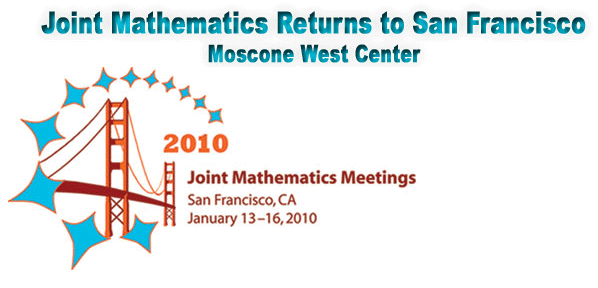NOTICE: Advance registrations will be accepted until 8:00 AM EST, Wednesday December 23. After that, please register on site at the meeting.The MAA Short Course will be held on Monday (1/11/10) and Tuesday (1/12/10) in Room 2004, 2nd Floor, Moscone West (AMS) and in Room 2002, 2nd Floor, Moscone West (MAA). The Registration Desk for the short courses and the tutorial will be located in the foyer outside these rooms, on Monday (1/11/10) from 8:00 a.m. to noon only. |
Exploring the Great Books of Mathematics
January 11 - 12, 2010, Room 2002, 2nd Floor, Moscone Center West
(Preceding the Joint Mathematics Meetings)
This two-day Short Course on Exploring the Great Books of Mathematics is organized by Amy Shell-Gellasch, Beloit College, and Glen Van Brummelen, Quest University, and will take place on Monday and Tuesday, January 11 and 12. The MAA Short Course is partially supported by the Raymond Brink Fund.
Every intellectual endeavor has key moments when some new monumental work shakes its foundations and builds new ones. How these great books affect the future might be clear within months of publication, or may take centuries to develop; in ways we may not even fully recognize, they shape our thoughts. We shall concentrate on only four great books in mathematics, spending half a day on each. We shall delve deeply into the texts, translations, and commentaries, do some reading in each of the original texts, and consider their influences on later generations.
The speakers and their talks are:
Alex Jones, New York University, Ptolemy's Almagest: Greek mathematics and the heavenly bodies. Ptolemy wrote his textbook on astronomy, the Almagest, in Alexandria around A.D. 150 at the peak of the Roman Empire. In this book he adapted the geometry of the Greeks and the arithmetic of the Babylonians to the problems of finding an accurate, quantitative description of the movements of the Sun, Moon, stars, and planets. We will explore how Ptolemy uses such resources as a place-value notation for precise numerical data, trigonometrical functions, and recursive algorithms to the deduction of how our universe works, resulting in a cosmology that remained the standard one for more than a thousand years.
George Smith, Tufts University, Newton's Principia. Isaac Newton had developed the calculus to an impressive point by 1671, yet in his Principia of 1687 he resorts instead to a form of geometry incorporating limits. That has raised a question about the extent to which his knowledge of the calculus informed the mathematics of the Principia--a question that has received such dubious answers as "he did it all first in the calculus and then transformed it into geometry." The diversity of mathematical techniques in the Principia, however, makes simple answers to the question impossible. The Principia lays out a sustained empirical argument. The diversity of mathematical techniques in it stems from the specific problems for which that argument required mathematical solutions. The course will accordingly first lay out the structure of the argument in the Principia, so that attendees can see why each of the proved propositions and lemmas is in the book. It will then examine a selection of propositions central to the argument, each demanding its own distinctive mathematical techniques. The goal will be to put attendees in position to assess for themselves the extent of the influence Newton's mastery of the calculus had on the mathematics at different places in the Principia.
Ivor Grattan-Guinness, Middlesex University Business School, Tracking the great writings of mathematics. In 2005 Elsevier published a book that I edited, Landmarks in Western Mathematics, 1640-1940, 1050 pages. In it 77 articles recorded the history of 89 books or papers that substantially influenced the development of mathematics in some way or another over the chosen period. In this lecture I shall review the means by which the writings were chosen, and the various forms of influence that had to be appraised. The difficulties of assessing the impact and influence itself will be emphasized.
Robert E. Bradley, Adelphi University, and Ed Sandifer*, Western Connecticut State College, Cauchy and the Cours d'analyse. Cauchy's Cours d'analyse de l'École royale polytechnique is often cited as the beginning of modern rigor in mathematics. It is also said that Cauchy wrote the book to improve the teaching of calculus, and that Cauchy was a very unpopular teacher. How rigorous was the Cours d'analyse? How different is it from what came before, and from what we use today? Is it a calculus book or an analysis book? Could we (or should we) teach from it today? Why has it never been translated into English? Is it just another "book nobody read"?
*NOTE. Because of health issues, Ed Sandifer will be unable to participate in person.
Fernando Q. Gouvêa, Colby College, How algebra became modern. B. L. van der Waerden's Moderne Algebra was both an account of and a manifesto for a new approach to algebra. It quickly established the new "abstract" or "structural" approach as the dominant way to understand the subject. It also pretty much created a subject, "modern algebra", that eventually established itself as a standard part of undergraduate mathematics education. We will look at the context and influence of the book, comparing it with other contemporary books and attempting to get a measure of its impact.
Registration
Advance registration fees are: member of the MAA/AMS--US$150; nonmember--US$200; student, unemployed, emeritus--US$75. On-site fees are: member of the MAA/AMS--US$160; nonmember--US$210; student, unemployed, emeritus--US$85. Click here to register.
